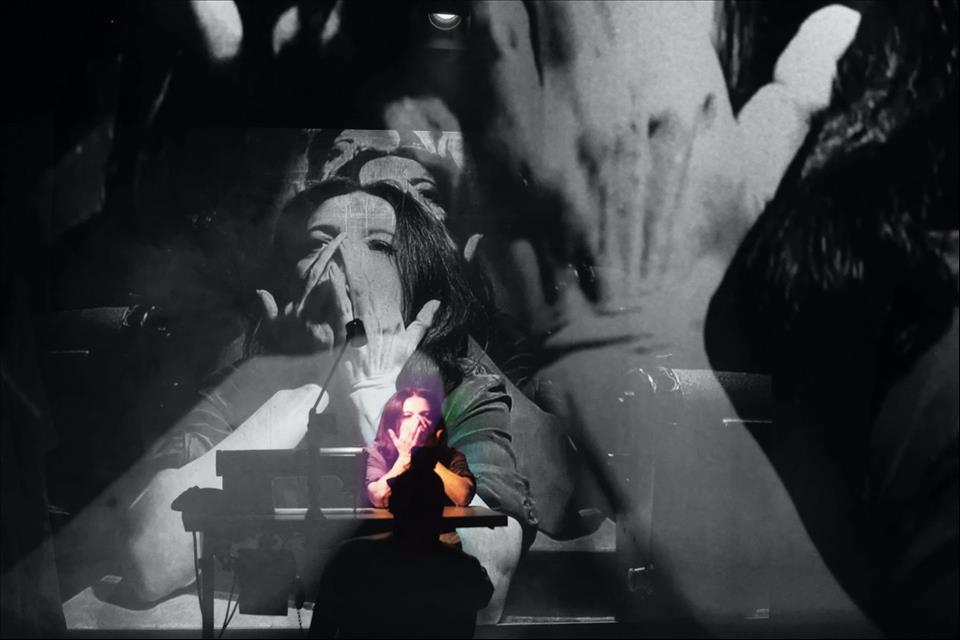
The Last Word: 'Painfully Poignant' Play Gives A Voice To Women Silenced By Russia's Legal System
They range from members of feminist band Pussy Riot to artist Sasha Skochilenko , who featured in the prisoner exchange with the west on August 1. Another voice is that of poet Natalya Gorbanevskaya , who protested on Red Square against the Soviet invasion of Czechoslovakia back in 1968.
The play offers a montage of their courtroom speeches, all based on verbatim transcripts, and all performed by Alisa Khazanova. In the final moments of the performance, a list of 85 more women who have been imprisoned recently scrolls silently in front of the audience. This ongoing tragedy continues to consume the lives of many women.
Under Putin, the Russian judicial system has become an instrument for silencing opposition voices. It's been reported that 99% of defendants whose cases reach Russian courts are found guilty. Human rights activists have been dealt excessively long prison sentences on trumped-up or trivial charges.
The law has become a powerful instrument in Putin's culture war to promote socially conservative views shaped by the Orthodox church, Russian nationalism and absolute subjection to Putin's dictatorial authority. Russia's invasion of Ukraine in 2022 has only exacerbated the situation. Those who protest against the war have been charged with offences ranging from “discrediting the Russian army” to full-scale treason.
Ironically, in a country where dissenting voices have been stifled, Russian court procedures allow – and indeed require – that every defendant should be given the opportunity to make a final statement. This happens once all the evidence in a case has been heard and just before the judge decides upon the sentence.
Articles 293 and 294 of the Russian Federation's Criminal Code determine that this final statement can be as long as the defendant chooses, and may not be interrupted unless it strays into the irrelevant.
The women quoted in this play take advantage of this paradoxical freedom to“have the last word” before they start their inevitable prison sentences. In their statements, they reflect on their plight, the justice system and the state of the country. This practice lends Narinskaya's play considerable authority as well as painful poignancy.
Voicing the voicelessThe Last Word focuses on the sheer absurdity of putting women on trial for daring to speak out. The women's speeches are verbatim transcripts, spoken by Khazanova.
Speaking as Alyokhina, she denounces proceedings held behind closed doors, which show that the judiciary have become ashamed of their practices. She also calls upon people to muster the courage to fight for freedom. Voicing another member of Pussy Riot, Nadezhda Tolokonnikova , she gives a furious speech denouncing the authoritarian church and state.
These were the same targets Pussy Riot had aimed at with their 30-second “punk prayer” in Moscow's Cathedral of Christ the Saviour in 2012, for which they were sentenced to two years in prison.
The trailer for The Last Word.
The other women, some just in their early 20s, are accused of a range of crimes. Some, of having incited minors to illegal protest actions in support of the now-deceased imprisoned opposition leader, Alexei Navalny. Others of calling for the constitution to be properly observed, or having outraged public decency by displaying art work for a production of The Vagina Monologues – and many other forms of human rights or political activism.
The state's response has been implacable: artist Sasha Skochilenko , who exchanged five supermarket price tags for slips of paper numbering Ukrainian victims killed during the invasion, was sentenced to seven years in prison.
Several speeches highlight the trauma for prisoners' children arising from their imprisonment, but otherwise they do not specifically highlight their role as women in this nightmare. The women argue their right to freedom of speech, to non-violent protest action and to living life under the rule of law. They expose the state's flimsy grounds for their arrests.
Speaking as Yulia Galyamina , she thanks all her persecutors for demonstrating that she, a woman, represents a real threat – especially to one small man who has nothing to offer the country except cheap pasta and violence.
Directed by Maxim Didenko, The Last Word uses front-of-stage projections of black and white video materials to evoke the “glass cage” in which defendants stand during Russian court proceedings. Loud, mournful music and atmospheric lighting mark the shifts from one brief narrative to another and the women punctuate their speeches with many extracts from Russian poetry, such as the enigmatic ending to Aleksandr Blok's The Twelve (1918).
The only male (silent) presence on the stage is the actor and dancer Ivan Ivashkin. At the start, he seems to represent the bloodied body of Christ, but by the end he is a fully clothed prison guard. The performance ends with a powerful poem, in which it is imagined that God may perhaps have longed to have a daughter – but would he have suffered her to be so tormented upon the cross?
Looking for something good? Cut through the noise with a carefully curated selection of the latest releases, live events and exhibitions, straight to your inbox every fortnight, on Fridays. Sign up here .
-
Russia
Theatre
Vladimir Putin
Review
Russian art
Russia-Ukraine
Give me perspective

Legal Disclaimer:
MENAFN provides the
information “as is” without warranty of any kind. We do not accept
any responsibility or liability for the accuracy, content, images,
videos, licenses, completeness, legality, or reliability of the information
contained in this article. If you have any complaints or copyright
issues related to this article, kindly contact the provider above.

















Comments
No comment